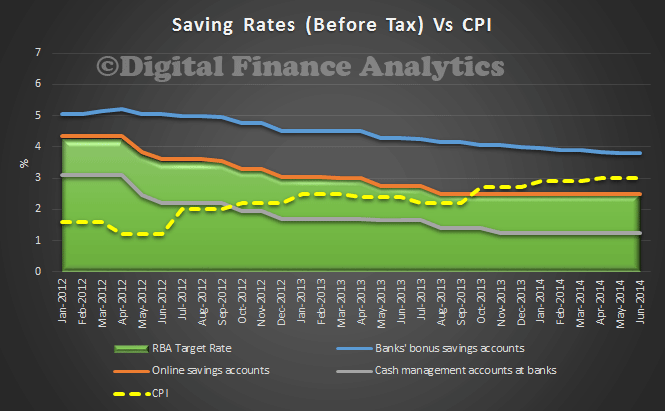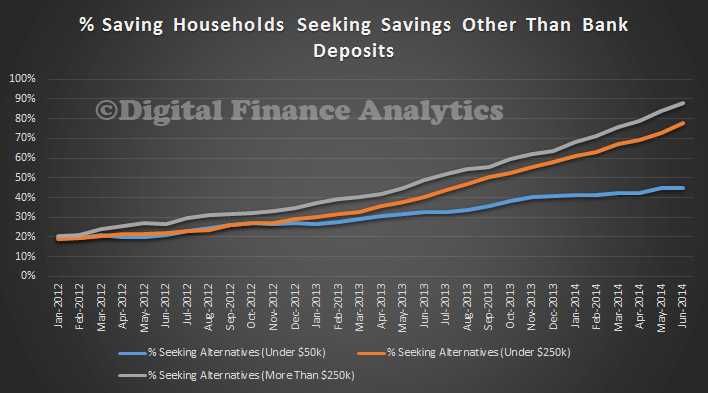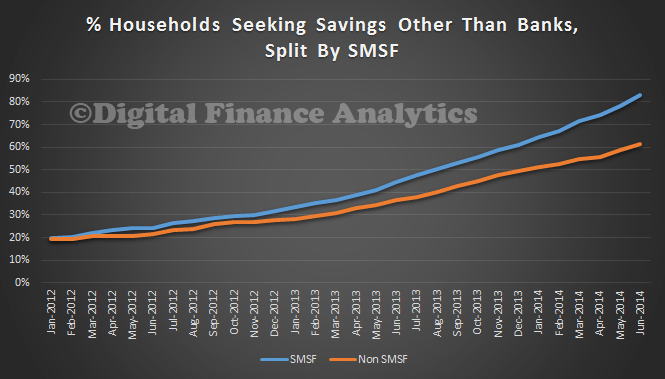The CPI data which came out from the RBA yesterday registered 3%. This was very bad news for households with savings in deposit accounts at the banks, because ever more are finding that returns after tax are well below CPI. This is part of a worrying trend for many, and is prompting them to seek out alternative and possibly higher risk saving vehicles. Today we examine this issue in the light of latest data from our household surveys.
First, here are some benchmark savings rates mapped to the CPI and RBA benchmark rate. Many savings rates are now below the CPI, even before we consider the tax implications, as of course income from deposits is taxable. More and more households will see their savings eroded in real terms. It may not be as bad as in the UK, where thanks to even lower base rates, central bank intervention and other factors, deposit rates are around 1% and inflation above 3%, but its getting all too familiar.
 The RBA has observed in its monthly updates that investors are seeking higher risk, higher return alternatives to bank deposits. Our surveys illustrate this nicely. We have been asking savings households about their intentions each month. Now, up to 80% of households with savings of more than $250k are actively seeking alternatives. It is lower for smaller balances, because typically these need to be readily available in case of emergencies. But even here, 35% are reconsidering their options.
The RBA has observed in its monthly updates that investors are seeking higher risk, higher return alternatives to bank deposits. Our surveys illustrate this nicely. We have been asking savings households about their intentions each month. Now, up to 80% of households with savings of more than $250k are actively seeking alternatives. It is lower for smaller balances, because typically these need to be readily available in case of emergencies. But even here, 35% are reconsidering their options.
 We also split the analysis between those saving within SMSF and those outside, as SMSF have advantaged tax treatment we expected these savers to be less concerned, but not so. We found that more of those saving via a SMSF were more actively seeking alternatives than those saving in their own names. This is a clue to why SMSF’s are investing direct in property.
We also split the analysis between those saving within SMSF and those outside, as SMSF have advantaged tax treatment we expected these savers to be less concerned, but not so. We found that more of those saving via a SMSF were more actively seeking alternatives than those saving in their own names. This is a clue to why SMSF’s are investing direct in property.
 For households looking beyond bank deposits, it is worth highlighting they are moving away from secure savings options, because of course the government guarantee on deposits remains at $250,000 per customer per institution without charge. So if households start looking for other options, they might consider shares (though the market is close to its highs), property (will prices rise further?) or other wealth management products, where fees are not well disclosed, advisors may not give best advice, and returns are uncertain. There are certainly no simple alternatives. That in turn allows the banks to let their deposit rates slip, source funding cheaper from overseas wholesale markets, and by maintaining loan deposit rates, bolster their profits. We are mandated to save, yet the fact is, its hard to find solutions which provide returns above inflation at reasonable risk. Caveat Emptor!
For households looking beyond bank deposits, it is worth highlighting they are moving away from secure savings options, because of course the government guarantee on deposits remains at $250,000 per customer per institution without charge. So if households start looking for other options, they might consider shares (though the market is close to its highs), property (will prices rise further?) or other wealth management products, where fees are not well disclosed, advisors may not give best advice, and returns are uncertain. There are certainly no simple alternatives. That in turn allows the banks to let their deposit rates slip, source funding cheaper from overseas wholesale markets, and by maintaining loan deposit rates, bolster their profits. We are mandated to save, yet the fact is, its hard to find solutions which provide returns above inflation at reasonable risk. Caveat Emptor!
